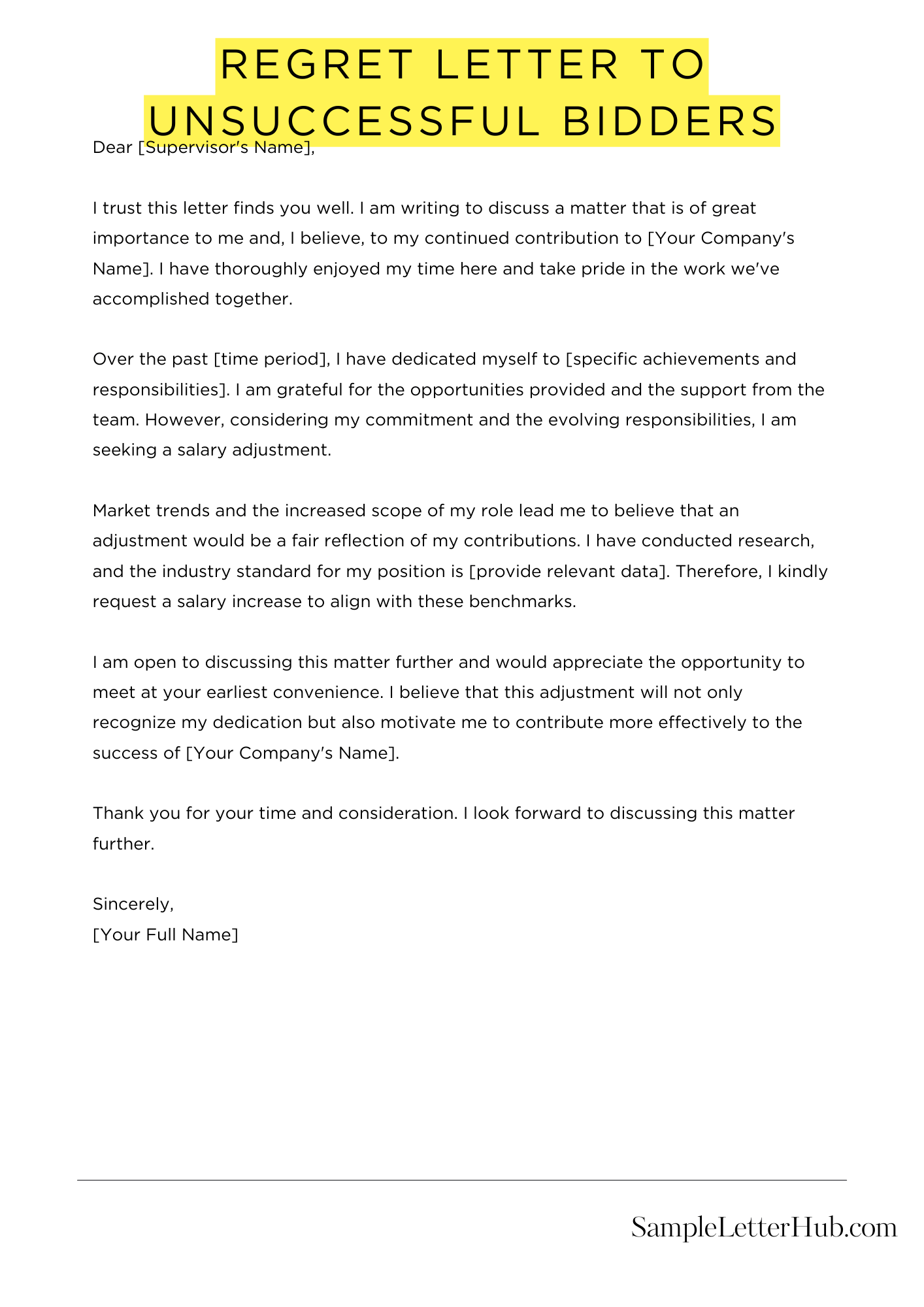Regret Letter To Unsuccessful Bidders is a letter that is sent to the bidders who have not been successful in winning the bid. The purpose of this letter is to inform the unsuccessful bidders that they have not been selected and to thank them for their participation in the bidding process.
In this article, we will share templates/examples/samples of Regret Letter To Unsuccessful Bidders. These templates will help you to write a regret letter that is professional, courteous, and informative.
Regret Letters To Successful Applicants
Dear [Recipient Name],
We regret to inform you that your bid for the [Project Name] project has not been selected.
We received a large number of qualified bids, and the competition was very strong. Your bid was well-written and presented, but ultimately, we felt that other bids were a better fit for the project’s specific requirements.
We appreciate you taking the time to submit a bid. Your interest in our project is a testament to your professionalism and commitment to your work.
We wish you all the best in your future bidding efforts.
Sincerely,
[Your Name]

How to Write a Regret Letter to Unsuccessful Bidders
Writing a regret letter to unsuccessful bidders is an important part of the bidding process. It is an opportunity to thank the bidders for their time and effort, and to explain why their bid was not selected.
Be Clear and Concise
The letter should be clear and concise. It should state the name of the project, the date of the bid, and the name of the unsuccessful bidder. It should also state the reason why the bid was not selected.
Be Professional
The letter should be professional and respectful. It should be written in a formal tone, and it should avoid using any negative language.
Be Specific
The letter should be specific about the reason why the bid was not selected. This will help the unsuccessful bidder to understand why they were not selected, and it will help them to improve their bids in the future.
Be Positive
The letter should be positive and encouraging. It should thank the unsuccessful bidder for their time and effort, and it should encourage them to continue to bid on future projects.
Be Timely
The letter should be sent to the unsuccessful bidder as soon as possible after the bid has been awarded. This will help the unsuccessful bidder to move on from the rejection, and it will help them to focus on future opportunities.
Use a Template
There are many templates available online that can be used to write a regret letter to unsuccessful bidders. These templates can help you to save time and to ensure that your letter is professional and well-written.
Proofread Your Letter
Before you send the letter, be sure to proofread it carefully. This will help you to catch any errors, and it will help you to make sure that the letter is clear and concise.
FAQs about Regret Letter To Unsuccessful Bidders
What is the purpose of a regret letter to unsuccessful bidders?
A regret letter is a formal communication sent to unsuccessful bidders to inform them that their bid was not selected. It expresses appreciation for their participation and provides a brief explanation of the selection process.
What are the key elements of a regret letter?
A regret letter typically includes the following elements:
- A clear statement that the bid was not selected.
- An expression of appreciation for the bidder’s participation.
- A brief explanation of the selection process.
- An offer to provide feedback upon request.
- Contact information for the contracting officer.
When should a regret letter be sent?
A regret letter should be sent as soon as possible after the bid selection decision has been made. This allows unsuccessful bidders to receive the news promptly and begin exploring other opportunities.
How should a regret letter be written?
A regret letter should be written in a professional and courteous tone. It should be clear and concise, and it should avoid using negative or judgmental language.
What are some tips for writing a regret letter?
Here are some tips for writing a regret letter:
- Be clear and concise.
- Be professional and courteous.
- Avoid using negative or judgmental language.
- Offer to provide feedback upon request.
- Proofread the letter carefully before sending it.

